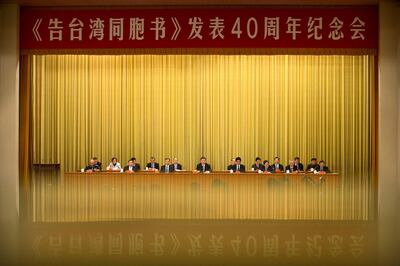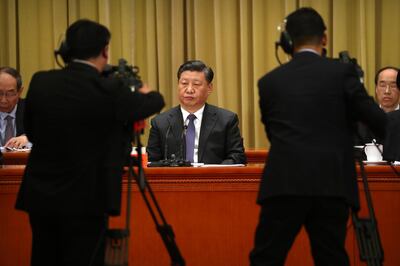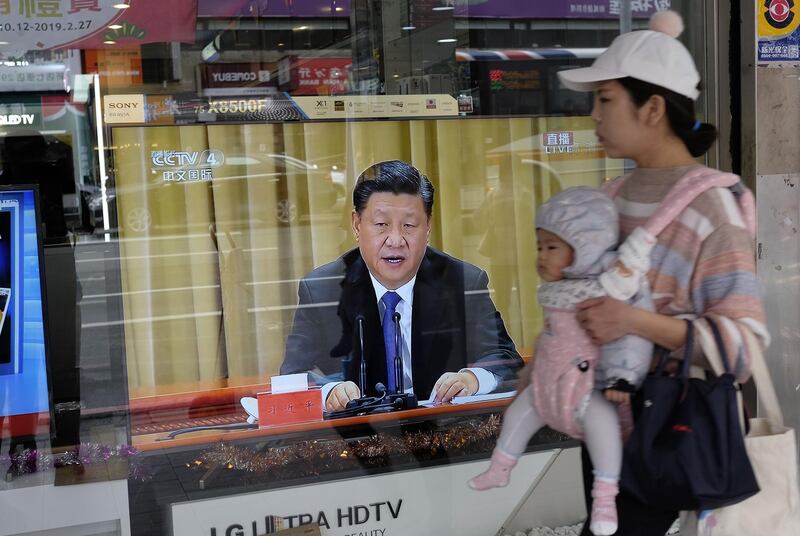Taiwan's unification with the mainland is "inevitable", President Xi Jinping said on Wednesday, warning against any efforts to promote the island's independence and saying China would not rule out the option of using military force to bring it into the fold.
China still sees democratic Taiwan as part of its territory to be reunified, despite the two sides being ruled separately since the end of a civil war on the mainland in 1949.
"China must and will be united … which is an inevitable requirement for the great rejuvenation of the Chinese people in the new era," Mr Xi said in a speech commemorating the 40th anniversary of a message sent to Taiwan in 1979, in which Beijing called for unification and an end to military confrontation.
"We make no promise to give up the use of military force and reserve the option of taking all necessary means" against Taiwanese separatist activities and "outside forces" that interfere with reunification, he said.
Mr Xi described unification under a "one country, two systems" approach that would "safeguard the interests and well-being of Taiwanese compatriots".

Taiwan considers itself a sovereign state, with its own currency, political and judicial systems, but has never declared formal independence from the mainland.
Relations have been strained for the past two years since the election of President Tsai Ing-wen, who has refused to acknowledge Beijing's stance that the island is part of "one China".
On Tuesday, Ms Tsai warned Beijing that Taiwan's people would never give up the kind of freedoms unseen on the authoritarian mainland.
Beijing "must respect the insistence of 23 million people for freedom and democracy" and "must use peaceful and equal terms to handle our differences", she said.
To accommodate differences in Taiwan's political system and civil society, China has proposed adopting the "one country, two systems" policy, which was implemented in Hong Kong after the British handed the city back to China in 1997.

But some say the erosion of civil liberties in Hong Kong sets a negative precedent for Taiwan.
"They [China] are gobbling up Hong Kong, not just politically but culturally and economically too", Claudia Mo, a pro-democracy Hong Kong politician, told AFP.
She said that few would be won over by Xi's suggestion that Hong Kong and Macau could be a blueprint for Taiwan given how freedoms have rapidly faded there.
"It's so obvious that they're trying to assimilate Hong Kong into wider mainland China in every way. How would any Taiwanese think that's going to work for them?"
But others believed Taiwanese would slowly come on board.
"People's hearts won't change in one day, but I think one country, two systems is a way to do it. The unification might take one, two, or even three more generations to achieve," said a 55-year old construction worker in Hong Kong who gave his surname as Lam.
______________
Read more:
China's President Xi Jinping visits Abu Dhabi for a 'new phase of co-operation'
Xi Jinping: China and the UAE are both proud to have enterprising and creative people who never give up on their dreams
Little Taiwan determined to stay out of China's clutches
______________
Last October, tens of thousands of Taiwan independence campaigners held the first large-scale protest calling for an outright independence vote since the island first became a democracy more than 20 years ago.
But some in Taiwan say worsening relations with Beijing have harmed business, as cuts to pensions and a reduction in public holidays compound frustrations over a stagnant economy where salaries have not kept up with the rise in cost of living.
Last year, Taiwan's ruling party suffered a massive defeat in midterm polls, causing Ms Tsai to resign as leader of the ruling Democratic Progressive Party, while the main opposition Kuomintang, which oversaw an unprecedented thaw with Beijing before Ms Tsai took office in 2016, made gains.
Beijing has adopted a multi-pronged approach to diminish Taiwan's presence on the international stage in recent years, including blocking it from global forums and poaching its dwindling number of official diplomatic allies.
China has also successfully pressured global firms to list Taiwan as part of China on their company websites.





